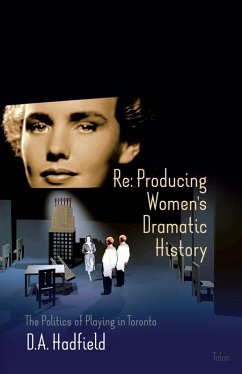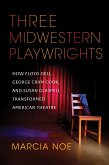Within the last generation, Canadian drama, like other literary forms, has seen the emergence of works by women that re-vision the role of women in history. However, in order to write themselves into theatre history, women have had to negotiate a complex journey through both pages and stages, a network of public production that is highly politically charged at every turn. This book examines the strategies employed by seven feminist productions that have managed to achieve a canonic place in the recorded history of Canadian theatre. All of the plays under consideration here exist (or have existed) in at least one published script form.
However, Dorothy Hadfield's purpose here is not to analyze these scripts for the definitive meaning of the narratives in these plays, nor is she trying to suggest how a reader or audience should inevitably read them. Instead, Hadfield is trying to account for how and why these scripts came to exist in published form, given the strong implicit connection between publication and a public assumption of good" or successful" theatre. In a system where textual visibility leads to opportunities for study, reproduction and validation for both play and playwright, the permanence of script publication can have real economic and ideological advantages. By analyzing publicity materials, photos, programs, reviews, box office and theatre records, it is possible to trace the process of creating a theatrical success," as well as to assess what effect that critical verdict has on the shape of the script publications of these works. In effect, by placing the textual artifacts left behind by these performances in the context of their production and reception, in part through a carefully constructed ideological compatibility throughout the production process, it is possible to investigate how the politics of the theatrical process influences what we perceive as good" playwriting.
However, Dorothy Hadfield's purpose here is not to analyze these scripts for the definitive meaning of the narratives in these plays, nor is she trying to suggest how a reader or audience should inevitably read them. Instead, Hadfield is trying to account for how and why these scripts came to exist in published form, given the strong implicit connection between publication and a public assumption of good" or successful" theatre. In a system where textual visibility leads to opportunities for study, reproduction and validation for both play and playwright, the permanence of script publication can have real economic and ideological advantages. By analyzing publicity materials, photos, programs, reviews, box office and theatre records, it is possible to trace the process of creating a theatrical success," as well as to assess what effect that critical verdict has on the shape of the script publications of these works. In effect, by placing the textual artifacts left behind by these performances in the context of their production and reception, in part through a carefully constructed ideological compatibility throughout the production process, it is possible to investigate how the politics of the theatrical process influences what we perceive as good" playwriting.
Dieser Download kann aus rechtlichen Gründen nur mit Rechnungsadresse in A, D ausgeliefert werden.









